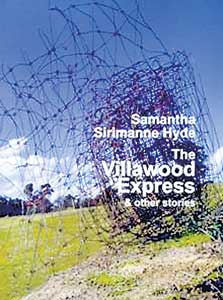
Down Under Lankans down but not outThe Villawood Express and other stories by Samantha Sirimanne Hyde. Ginninderra Press, ACT, Australia. Reviewed by Dinali Fernando Samantha Sirimanne Hyde’s debut collection of short stories makes an interesting addition to the growing body of Sri Lankan-Australian expatriate fiction in the tradition of writers such as Yasmine Gooneratne, Chitra Fernando, Chandani Lokuge and Channa Wickremesekera. Sirimanne Hyde began writing in Sri Lanka as one of a promising group of poets from the Kelaniya University in the ’80s, contributing to the English Department’s literary magazine “Blink”. This is her first short-story collection, the outcome of a master’s degree in creative writing she completed last year at Sydney’s Macquarie University.
The writer migrated to Australia in 1990, where she worked for 10 years as an immigration officer. Her duties had their dangerous side, which including taking part in raids, many conducted in some of the more dubious neighbourhoods of Sydney. The impact of these experiences is reflected in her stories. The “express” referred to in the title story is an ironic reference to the vehicle that transports illegal immigrants to Sydney’s Villawood Detention Centre. The centre is a recurring setting in several of the stories: in one story, detainee Tilak sits frightened and hopeless, stripped of his savings by an unscrupulous “friend”; in another story, Sucharita sees the detention centre as a safe home and a refuge from those who had forced her into the sex industry; for disabled Tommy, Villawood is a transit point between a fragile life of love and independence he created for himself in Australia and possible destitution when he is sent back to India. For these characters, living on the dark side of expatriation, Villawood is an image and symbol of displacement. At a time when Sri Lankans seem to be migrating to Australia in increasing numbers, it is tempting to read these stories as grim warnings against illegal immigration. But it would be very limiting to say this collection is only about migration and displacement. These well-crafted stories are concerned with real human issues, and the characters are not figures merely dressed up to represent issues of expatriation and contemporary politics. The author is drawn to people caught up in a variety of marginal situations; they range from a forgotten migrant, a spurned middle-aged lover and a jilted husband to a trusting student whose thesis has been plagiarised by his roommate. Although the political concerns underlying the stories are often grim, the politics never overwhelm over the human aspect. The focus stays firmly on the individual and the human side of the circumstances he or she faces. Many of the stories are imbued with a Buddhist philosophy that is hard to miss. The characters are all, in essence, making sansaric journeys in another land, a land that is at once alien and familiar. Caught up in contemporary tragedies, some of the characters achieve mini-triumphs, such as the liberated ex-prostitute Sucharita, or the traumatised Nalini, who is taking tentative steps to rebuild her life after a problematic childhood. The stories are also peopled with characters that society might dismiss as losers: the jilted and the deceived, such as the illegal migrant who isn’t shrewd enough to avoid getting caught by the authorities, and the middle-aged everyman whose marriage ends in a series of events that he has unwittingly initiated. Sirimanne Hyde looks at all her characters with a compassionate eye, and helps the reader see the world through their eyes. Although an air of melancholy and resignation hangs over these characters, who are suffering unfair and indifferent treatment, the writer offers a sense of hope in her affirmation of life, love and faith. Different in tone are the two stories, “The Doctor’s Wife” and “Harold’s Decision”, which are both marked by humour. The first concerns a brilliantly scheming woman, Sheila, who, in her pursuit of a perfect life in Australia, quietly kills off her awful mother-in-law; the second tells of a middle-aged loner infatuated with an unattainable foreigner – contrasting tales of a determined fighter and a hopeless loser. In fact, an understated humour, at times ironic, absurd and always more than a touch dark, links many of the stories.It is even present in the heartbreaking “Ranjith’s Thesis”, which is about a man seeking consolation in religious philosophy – and arrack. This book is a promising debut by a writer who possesses a rich imagination. She is a thoughtful craftsman with a keen eye for detail and a rare gift for seeing significance in the apparently insignificant. The descriptions are highly visual. The writer has a gift for focusing on a peripheral detail or image that conveys through suggestion a more powerful effect than a longer, more detailed description would have. One story, about a spurned lover, ends with a close-up of a box of chocolates melting on a bench under “a ruthless December sun”. Among many striking and eloquent images in these pages are those of a broken Buddha statue and the expression on its face, and a switched-off fountain at the bottom of a suburban garden in a story about heartbreak. Sirimanne Hyde’s stories do not go in for conventional endings, with convenient closures. The result is a greater sense of fulfillment than might be found in more conventionally tailored tales. The Villawood Express and Other Stories is published by Ginninderra Press, Canberra. The book is is listed locally by the Perera-Hussein Publishing House, and is available in local bookshops. http://www.villawoodexpress.com/ |
|
||||||
|| Front
Page | News | Editorial | Columns | Sports | Plus | Financial
Times | International | Mirror | TV
Times | Funday
Times || |
| |
Reproduction of articles permitted when used without any alterations to contents and a link to the source page.
|
© Copyright
2008 | Wijeya
Newspapers Ltd.Colombo. Sri Lanka. All Rights Reserved. |
